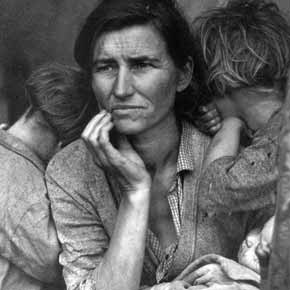 |
Front
Page »
Inside Pages » Vol 2 No
45 » here
Poor get richer
That's the unmistakable conclusion according to
an economist, and anti-globalizers need to respond
by Kevin Potvin
The
Republic
 |
| photo:Dorothea
Lange |
Numbers lie. Or rather, people torture numbers into saying
what they want them to say. And sometimes, they do it for the
best of intentions.
It is by now an unquestioned commonplace in the
anti-globalization movement, for example, that over the last
three decades of globalization, the rich have gotten richer,
and the poor, poorer. This widening gap in global incomes, it
is widely understood, is creating destabilizing forces–namely,
widespread bitterness and resentment. The scenario presented
by spokespeople for the anti-globalization movement envisions
a growing army of the wandering poor ranging against a
thinning cadre of barricaded rich. The appearance of an
American Airlines jet on the 88th floor of World Trade Center
Tower 2 was, to many, globalization brought home.
But is it all true? No doubt, the rich have gotten richer,
but have the poor gotten poorer? An economist at Columbia
University, Xavier Sala-i-Martin, says numbers supporting this
key anti-globalization argument are all wrong. His thesis
deserves attention, not only because it goes to the heart of
the anti-globalization movement, but also because he sounds
correct.
Most data suggesting a widening gap of income,
Sala-i-Martin says, use country-by-country figures. Thus, two
countries with vastly different populations, like Ghana and
China, for example, are weighted equally. If the average
resident of China has experienced a rise in income, and the
average resident of Ghana a decline, they would cancel each
other out, despite the fact there are 12,000 Chinese to every
one Ghanian. The populations of the 48 countries of Africa
combined add up to about half the population of China.
When Sala-i-Martin corrected for this oversight in the 1999
United Nations Human Development Report, he found startlingly
different conclusions. Rather than compare countries to each
other, he compared individuals. What he found was that, while
in 1970, the largest global income bracket earned about $1,500
in today's dollars, today, the largest income bracket earns
about $12,000–a figure roughly equivalent to the average
income in Portugal.
"That's what I call a new world middle class," says
Sala-i-Martin.
The biggest influence on this statistic is found in China
and India, whose two economies have expanded immensely, and
whose populations account for over a third of humanity.
Another problem with typical statements about incomes
around the world is their failure to account for varying local
costs of living. While a dollar-a-day income is admittedly
low, it goes far further in Addis Ababa than in Vancouver. For
income numbers to have any relevance, they need to be
converted into a typical basket of goods necessary to living,
at local prices. A dollar in Vancouver buys a slice of pizza.
In Ethiopia, it can buy a whole family a day's worth of good
meals. A common scale needs to be established before
comparisons of local average incomes offer any useful
information. No such scale has been widely adopted.
Nevertheless, there still remains a widening gap between
the rich and poor. While the poor may be getting richer, the
rich are getting richer too, and faster. Sala-i-Martin argues
that it may be necessary to more quickly enrich the rich in
order to also enrich the poor: "If our indexes say that
inequality rises, then rising inequality must be good, and we
should not worry about it."
But a growing body of literature suggests that, when it
comes to social stability and happiness, income is not as
important as equality. Widespread bitterness and resentment
can occur where most people are well-off, if a portion of the
population is excessively wealthier. And where populations are
in poverty, there can exist relative peace and contentment if
the rich among those populations are not too many times more
wealthy than the poor.
If this is true, then local inequalities, not absolute
measures of income, should be the socially responsible target.
That may be a trickier cause to champion. Part of the
globalization process has included mass communication
technologies. Now that television, cell phones, and the
internet are available virtually everywhere, the foreign has
become local too. Even if a generally poor society were to
achieve a stable level of local equality, a vast and
destabilizing inequality would be everyday apparent over the
channels of modern mass communication. But the
alternative–cutting off access to images of wealth for
relatively poorer people–is patronizing and, anyway,
impossible.
Sala-i-Martin may think that as long as the poor get
richer, inequality is nothing to worry about; and
anti-globalizers may go on thinking the poor are getting
poorer. Both are wrong.
Front
Page »
Inside Pages » Vol 2 No
45 » here
top of page |
 |

